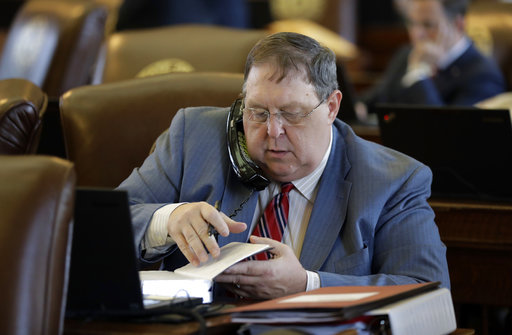AUSTIN, Texas (AP) — Republicans who control Congress and the White House have promised to slash the size of the federal government while easing regulations on guns, the environment and energy production. But in the nation’s largest conservative state of Texas, it may not be enough.
A proposal in the GOP-led Legislature would allow Texas to ignore federal law and court rulings and forgo enforcing national regulations. Arizona already has approved a similar policy, and other states want to follow suit, despite the Constitution’s Supremacy Clause, which stipulates federal laws and treaties take precedence.
State Rep. Cecil Bell’s Texas Sovereignty Act allows for overriding federal laws through the same process as passing a bill. First a legislative committee, then the whole Legislature, would vote for nullification, and then the governor would sign his approval.
“This is an effort to establish how states can say, ‘No, you can’t do that in our state,” said Bell, a Republican from Magnolia, about 45 miles north of Houston.
Bell is “very thankful” Republicans control Washington but says he wants to prohibit future overreach from the federal government.
One key target could be legalization of gay marriage. In 2015, Bell introduced a bill prohibiting Texas from enforcing court orders sanctioning gay marriage — a pre-emptive strike against the landmark Supreme Court decision later that year. The bill died on the last day to pass House legislation, but only amid Democratic stalling tactics.
The Texas Sovereignty Act is an even longer shot. Democratic Rep. Chris Turner, Bell’s colleague on the committee hearing the bill, said he cannot imagine it even making the House floor because it’s “not a serious bill.”
“It proposes a structure for state nullification of federal laws which is clearly unconstitutional,” said Turner.
Constitutionality questions haven’t stopped the Texas Legislature before. Federal courts have savaged the state’s strictest-in-the-nation voter ID law, and the U.S. Supreme Court voided nearly all of its tough 2013 abortion law.
“If Texas has to live under California’s environmental regulations because the court says, ‘Oh no, Texas can’t be Texas, Texas has to be identical to California,’ this would make a legislative process to address that,” Bell said.
But rather than liberal California imposing its will on other states, some have suggested a “Calexit,” hoping that state might secede to escape President Donald Trump. The notion of Texas secession has popped up periodically over the years on the far right, but mostly quieted under Trump — and Bell isn’t looking to go that far.
The Arizona law passed in 2014 would allow the state to withdraw its resources from enforcing federal laws it deems unconstitutional, though it has been little used since then and hasn’t prompted major legal challenges. Oklahoma, Maine, and Idaho have proposed similar legislation this year.
Only Maine’s has won significant legislative support, but it is far narrower than Texas’ bill.
“In the Maine scenario, there is no determination of constitutionality involved, and it probably wouldn’t cover something like a Supreme Court ruling,” said Mike Maharrey, a spokesman for the 10th Amendment Center, which advocates for states’ rights.
Maine is also a far cry politically from Texas, which hasn’t voted for a Democratic presidential candidate since 1976. Trump snagged one of Maine’s four, proportionately awarded electoral votes in November.
Maharrey, who has recently seen a flurry of such legislation, said it’s grounded in anti-commandeering doctrine, meaning the federal government cannot force states to use their resources implementing federal programs. It’s also been used by blue states to promote things such as “sanctuary city” laws excusing police from enforcing federal immigration law.
“There are a number of bills based on this same concept, including bills pending in California and New York legislatures to create state sanctuaries,” Maharrey said.
Sandy Levinson, a University of Texas professor specializing in constitutional law, said that while states have the right to refuse to cooperate with the federal government by reserving resources, the only way they can contest the constitutionality of a federal law is to sue. Texas sued the Obama administration nearly 50 times but has been less-litigious so far under Trump.
“What would be special is if the Texas Legislature really and truly believes that Texas can decide on their own, ‘this is unconstitutional we’re not going to do it,'” Levinson said. “That’s just bonkers.”
Copyright 2017 The Associated Press. All rights reserved. This material may not be published, broadcast, rewritten or redistributed.







Surely they’ll be willing to give up federal money, as well.
They’d still demand it as “foreign aid.”
Whereby “ratification” of the Constitution, by way of original intent, has been interpreted to mean being chewed and shat on by rats.
Imagine the reaction in TX if the Federal Government responded to this bill by announcing the development of contingency plans to close all Federal installations, military bases and non-essential offices in Texas and the relocation of all Federal contractor manufacturing out of the state in 10 years. Goodbye Lockeed, goodbye Boeing, etc.
If it happened, the Texas economy would collapse. Even the treat would end this nonsense.
I really wanted Obama to do this.
We will only be part of the USA, with all the benefits that go with that, when we feel like it.
Goes with their complicity in the Trump/Russian collusion. Republicans hate the idea of a federal government except to fight wars for resources, which they too ready to allow your children to die in.